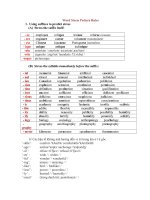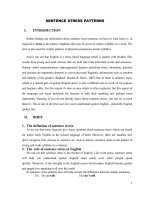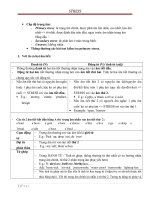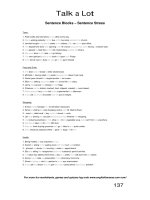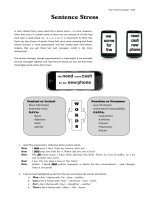SENTENCE STRESS RULES
Bạn đang xem bản rút gọn của tài liệu. Xem và tải ngay bản đầy đủ của tài liệu tại đây (80.14 KB, 5 trang )
Sentence Stress Rules
Sentence stress is the music of spoken English. Like word stress, sentence stress can help you to
understand spoken English, even rapid spoken English.
Sentence stress is what gives English its rhythm or "beat". You remember that word stress is
accent on one syllable within a word. Sentence stress is accent on certain words within
a sentence.
Most sentences have two basic types of word:
•
content words
Content words are the key words of a sentence. They are the important words that carry
the meaning or sense—the real content.
•
structure words
Structure words are not very important words. They are small, simple words that make
the sentence correct grammatically. They give the sentence its correct form—its structure.
•
If you remove the structure words from a sentence, you will probably still understand the
sentence.
•
If you remove the content words from a sentence, you will not understand the sentence.
The sentence has no sense or meaning.
•
Imagine that you receive this telegram message:
•
•
This sentence is not complete. It is not a "grammatically correct" sentence. But you
probably understand it. These 4 words communicate very well. Somebody wants you
to sell their car for them because they have gone to France. We can add a few words:
•
The new words do not really add any more information. But they make the message more
correct grammatically. We can add even more words to make one complete, grammatically
correct sentence.But the information is basically the same
In our sentence, the 4 key words (sell, car, gone, France) are accentuated or stressed.
Why is this important for pronunciation? It is important because it adds "music" to the
language. It is the rhythm of the English language. It changes the speed at which we speak (and
listen to) the language. The time between each stressed word is the same.
In our sentence, there is 1 syllable between SELL and CAR and 3 syllables between CAR and
GONE. But the time (t) between SELL and CAR and between CAR and GONE is the same. We
maintain a constant beat on the stressed words. To do this, we say "my" more slowly, and
"because I've" morequickly. We change the speed of the small structure words so that the
rhythm of the key content words stays the same.
Do we say every word with the same stress or force? No. We make the important words BIG
and the unimportant words small. What are the important words in this sentence? Yes, that's
right: WANT and GO.
•
We WANT to GO.
•
We WANT to GO to WORK.
•
We DON'T WANT to GO to WORK.
•
We DON'T WANT to GO to WORK at NIGHT.
The basic rules of sentence stress are:
1. content words are stressed
2. structure words are unstressed
3. the time between stressed words is always the same
The following tables can help you decide which words are content words and which words are
structure words:
Content words - stressed
words carrying the meaning
main verbs
nouns
adjectives
adverbs
negative auxiliaries
Structure words - unstressed
words for correct grammar
pronouns
prepositions
articles
words for correct grammar
conjunctions
auxiliary verbs
Exceptions
The rules above are for for what is called "neutral" or normal stress. But sometimes we can
stress a word that would normally be only a structure word, for example to correct information.
Look at the following dialogue:
"They've been to Mongolia, haven't they?"
"No, THEY haven't, but WE have."
Note also that when "be" is used as a main verb, it is usually unstressed—even though as a main
verb it is also a content word.
Sentence Stress Illustrated:
Sentences
Meaning
1. I don’t think she would write it.
I don’t think that, but someone else does.
2. I DON’T think she will listen to
him.
It is not true that I think that.
3. I don’t THINK she will listen to
him.
I don’t think that, I know that. Or: I don’t think that, but I
be wrong.
4. I don’t think SHE will listen to
him.
I think that someone other than her will listen to him.
5. I don’t think she WILL listen to
him.
I think that she is will not be willing or agreeable to listen
him.
6. I don’t think she will LISTENto
him.
Instead of listening, she might talk to him.
7. I don’t think she will listen
toHIM.
I think that she will listen to someone else than him.


